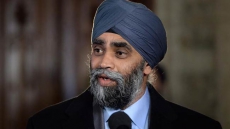OTTAWA — Women will outnumber men on what could turn out to be the most-influential group of people around Prime Minister Justin Trudeau and Finance Minister Bill Morneau.
Morneau on Friday unveiled the federal government's new advisory council — a team that will help draw up a plan designed to get the economy out of a rut.
The lineup of business and academic leaders includes eight women and six men.
The advisers, who will be paid an annual salary of $1, are responsible for helping the government prepare a long-term growth strategy to be released by the end of the year.
The council members' names were made public just days before the release of the Liberal government's first budget.
The budget, to be tabled Tuesday, is expected to spell out much of Ottawa's plans to spend billions of dollars on measures — such as infrastructure — aimed at boosting productivity and economic growth.
Last month, Morneau announced that the advisory council would be chaired by Dominic Barton, the global managing director of consulting giant McKinsey & Company.
At the time, Morneau said council members would meet him regularly and provide advice "on concrete policy actions to help create the long-term conditions for economic growth focused on the middle class."
The council also includes prominent business figures such as Mark Wiseman, president and CEO of the Canada Pension Plan Investment Board and Michael Sabia, CEO of the Caisse de depot et placement du Quebec, the province's largest pension fund manager.
Other members:
— Elyse Allen, president and CEO, General Electric Canada
— Katherine Barr, general partner, Mohr Davidow Ventures
— Jennifer Blanke, chief economist, World Economic Forum
— Kenneth Courtis, chairman, Starfort Investment Holdings
— Brian Ferguson, president and CEO, Cenovus Energy Inc.
— Suzanne Fortier, principal and vice-chancellor, McGill University
— Carol Anne Hilton, CEO, Transformation
— Carol Lee, CEO and co-founder, Linacare Cosmotherapy Inc.
— Christopher Ragan, associate professor of economics at McGill University and chair of the Ecofiscal Commission
— Angela Strange, partner, Andreessen Horowitz
— Ilse Treurnicht, CEO, MaRS Discovery District

"I look forward to working with the council members, whose diverse backgrounds and impressive expertise will inform our work as we develop and implement a strategy that will build on the foundation we will lay with budget 2016," Morneau said in a statement.
Internal federal documents show that Barton, a Canadian, has been called upon in the past to advise the government.
He was scheduled to deliver a presentation last May to a deputy ministers' committee on economic trends and policies.
Barton's talk was to address the "drivers of change in the global and economic context," particularly as they relate to innovation, according to a memorandum prepared for the senior associate deputy minister of Employment and Social Development Canada. The briefing note was obtained by The Canadian Press via the Access to Information Act.
The document said material provided prior to Barton's presentation by McKinsey identified several forces responsible for the pace and scale of global change, including:
— The rise of emerging markets, with emphasis on the importance of emerging-market cities.
— The power of disruptive technologies, which are advances that have increased productivity while driving down demand for labour.
— The "massive strains" on all governments of the aging global population, which could force people to work longer.
— The shift to more-complex markets has made navigating political risks abroad a necessity.
— The changing nature of capitalism that makes longer-term thinking increasingly important for success.
In 2014, Barton and Wiseman co-authored a Harvard Business Review paper that argued "big asset owners," such as pension funds, insurance firms, sovereign wealth funds and mutual funds, should focus on more on the long term rather than taking a short-term approach.
"Simply put, short-termism is undermining the ability of companies to invest and grow, and those missed investments, in turn, have far-reaching consequences, including slower (gross domestic product) growth, higher unemployment, and lower return on investment for savers," their report said.




